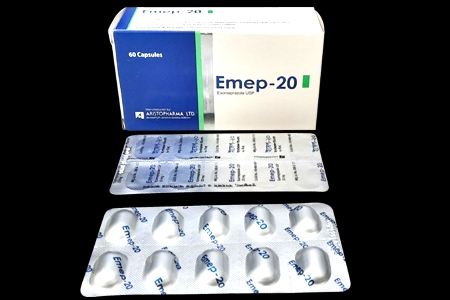ঔষধের বিস্তারিত বা বিকল্প ঔষধ জানতে ঔষধের নাম দিয়ে সার্চ দিন। যেমন- Napa বা Alatrol বা Amodis
Emep 20mg
TabletEsomeprazole
Aristo pharma
Other Strength:
- Glemep 2mg
Alternative:
- Opton 20mg
- MAXIMA 20mg
- Maxima MUPS 20mg
- Nexum 20mg
- Sergel 20mg
- Progut 20mg
- Esomep 20mg
- Esopra 20mg
- Esoz 20mg
- Esoben 20mg
- Esoben MUPS 20mg
- Esonix 20mg
- Nexum MUPS 20mg
- Maxpro 20mg
- Maxpro MUPS 20mg

Emep
Presentation:
Emep-20 Capsule: Each capsule contains Esomeprazole Magnesium Trihydrate USP equivalent to Esomeprazole 20 mg as enteric coated pellets.
Emep-40 Capsule: Each capsule contains Esomeprazole Magnesium Trihydrate USP equivalent to Esomeprazole 40 mg as enteric coated pellets.
Emep Tablet: Each enteric coated tablet contains Esomeprazole Magnesium Trihydrate USP equivalent to esomeprazole 20 mg.
Emep IV Injection: Each vial contains lyophilized Esomeprazole Sodium equivalent to Esomeprazole 40 mg.
Indications:
Emep Tablet/Capsule:
For the treatment of heart burn and other symptoms associated with GERD
For the healing of erosive esophagitis
For maintenance of healing of erosive esophagitis
In duodenal and gastric ulcer
In combination with amoxycillin, clarithromycin, esomeprazole is used for the treatment of H. pylori infection and duodenal ulcer disease to eradicate.
Emep IV Injcetion:
Emep IV injection is indicated for gastric antisecretory treatment when the oral route is not possible such as bleeding peptic ulcer, short-term treatment of GERD, erosive esophagitis, pre and post operative hyperacidity.
Dosage & Administration:
Emep Tablet / Capsule:
Esomeprazole tablet/capsule should be taken one hour before meal.
Indications Dose Frequency
Symptomatic Gastroesophageal
Reflux Disease 20 mg Once daily for 4 weeks
Healing of Erosive Esophagitis 20 or 40 mg Once daily for 4-8 weeks*
Maintenance of Healing of Erosive Esophagitis 20 mg Once daily
Duodenal Ulcer 20 mg Once daily for 2-4 weeks
Gastric Ulcer 20-40 mg Once daily for 8 weeks
H. pylori eradication reduces the risk of duodenal ulcer recurrence
Triple therapy
Emep 40 mg
Once daily for 10 days
Amoxycillin
1000 mg Twice daily for 10 days
Clarithromycin 500 mg Twice daily for 10 days
* The majority of patients are healed within 4 to 8 weeks. For patients who do not heal after 4-8 weeks, an additional 4-8 weeks treatment may be considered.
Emep IV Injcetion:
The recommended adult dose is either 20 mg or 40 mg Esomeprazole given once daily by intravenous injection (not less than 3 minutes) or intravenous infusion (10 to 30 minutes). Emep IV injection should not be administered concomitantly with any other medications through the same intravenous site. Treatment with Emep IV injection should be discontinued as soon as the patient is able to resume treatment with Emep capsule/tablet.
Injection:
Esomeprazole IV injection is obtained by adding 5 ml 0.9% sodium chloride to the vial containing powder. After reconstitution the injection should be given slowly over a period of at least 3 minutes. The injection should be used within 12 hours after reconstitution and can be stored at room temperature.
Infusion:
Esomeprazole intravenous infusion is prepared by first reconstituting the content of vial with 5 ml of 0.9% Sodium Chloride injection or 5% dextrose injection and further diluting the resulting solution to a final volume of 50 ml. The reconstituted solution should be administered as an intravenous infusion over a period of 10-30 minutes. The reconstituted solution should be used within 12 hours when Esomeprazole is dissolved in 0.9% Sodium Chloride and within 6 hours when dissolved in 5% dextrose.
Contrainidications:
Esomeprazole is contraindicated in patients who have known hypersensitivity to esomeprazole or any component of the formulation.
Warning & Precautions:
Geriatric patients: No dosage adjustment is necessary.
Renal insufficiency: No dosage adjustment is necessary.
Hepatic insufficiency: No dosage adjustment is necessary in patients with mild to moderate liver impairment. For patients with servere liver impairment a dose of 20 mg of esomeprazole should not be exceeded.
Side effects:
In general, esomeprazole is well tolerated in both short and long term use. Adverse events reported with esomeprazole include headache, diarrhoea, nausea, flatulence, abdominal pain, constipation and dry mouth.
Drug interaction:
Esomeparzole is extensively metabolized in the liver. Drug interactions studies have shown that esomeprazole does not have any clinically significant interactions with phenytoin, warfarin, quinidine, clarithromycin or amoxycillin. Esomeprazole may interfere with the absorption of drugs where gastric pH is an important determinant of bioavailability (e.g. ketoconazole, iron salts and digoxin).
Use in special groups:
Use in pregnancy: This drug should be used during pregnancy only if clearly needed.
Use in lactation: Esomeprazole is likely to be excreted in human milk, a decision should be made whether to discontinue nursing or to discontinue the drug, taking into account the importance of the drug to the mother.
Use in children: Children over 1 year are recommended to use oral Esomeprazole.
এই পাতাটি ৪৯৫ বার দেখা হয়েছে
রাজডক কী?
ফ্রী সদস্য হোন Click Here
ডাক্তার হিসাবে যোগদান করতে Click Here
নার্স / টেকনোলজিস্ট হিসাবে যোগদান করতে Click Here
ফ্রী সদস্য হোন Click Here
ডাক্তার হিসাবে যোগদান করতে Click Here
নার্স / টেকনোলজিস্ট হিসাবে যোগদান করতে Click Here

